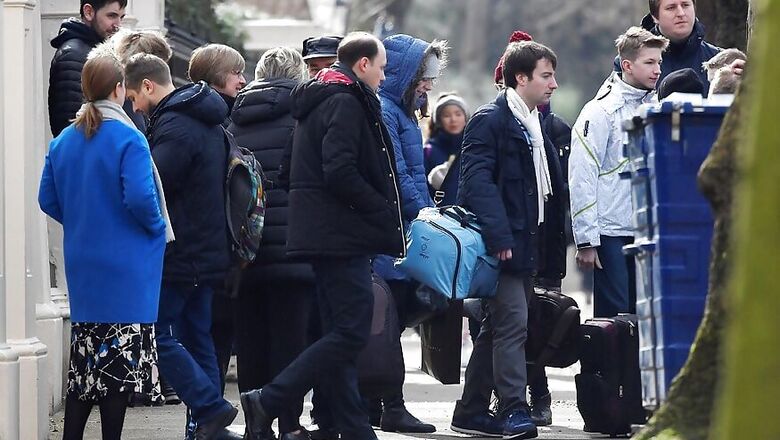
views
Moscow: Nearly two dozen Russian diplomats headed home on Tuesday after Britain's prime minister ordered them to leave because of a nerve agent attack on UK soil.
Several dozen people, including children, emerged from the Russian Embassy in west London with suitcases, bags and pet carriers.
Some hugged before they boarded vehicles, including a white minibus, and were driven away. They were expected to arrive in Moscow this evening.
On March 14, Prime Minister Theresa May gave the 23 diplomats, whom she said were undeclared intelligence agents, a week to leave Britain.
That prompted Russia to retaliate with its own expulsion of 23 British diplomats, who are expected to leave in the coming days.
Tensions between the two countries have risen since the March 4 poisoning of ex-Russian spy Sergei Skripal and his daughter, Yulia, in the English city of Salisbury. They remain in critical condition.
Britain says they were poisoned with a Soviet-developed form of nerve agent known as Novichok. Western powers see the attack as a sign of increasingly aggressive Russian meddling abroad.
Russia denied involvement, and President Vladimir Putin's spokesman, Dmitry Peskov, insisted Tuesday that "Russia has no stocks of chemical weapons of any kind." Asked why Russia isn't showing proof of its innocence, he said, "Let's stay sober-minded and first of all wait for proof from Britain" that Russia was to blame.
Britain's National Security Council was meeting today to consider possible further measures against Russia. May and other European Union leaders are due to discuss the poisoning at a summit Thursday.
The EU on Monday condemned the poisoning and called on Russia to "address urgently" British questions about the Novichok nerve agent programme.
The Russian Foreign Ministry accused Britain and other EU member states of developing similar nerve agents, and said Britain's government is stirring up "media hysteria" around the case to distract attention from troubles in negotiating the country's exit from the EU.
Russia insists it gave up all its chemical weapons under international oversight.
The British military and police are continuing to search for clues around Salisbury into what happened. International chemical weapons experts are due to take samples of the nerve agent.
British police investigators say it may take months to complete the widening inquiry. The focus is on the movement of the Skripals in the hours before they were found unconscious on a bench in the city 90 miles (145 kilometers) southwest of London. A police officer who came to their assistance is in serious condition.
"This is going to be frustrating for people," said Neil Basu, head of counterterrorism at the Metropolitan Police. "It is going to take weeks, possibly months to do this." Despite the diplomatic tensions, the Russian Interior Ministry said it will continue cooperating with British authorities on security issues.
Deputy Interior Minister Igor Zubov told Interfax that the Skripal case "won't change anything for us at all."

















Comments
0 comment